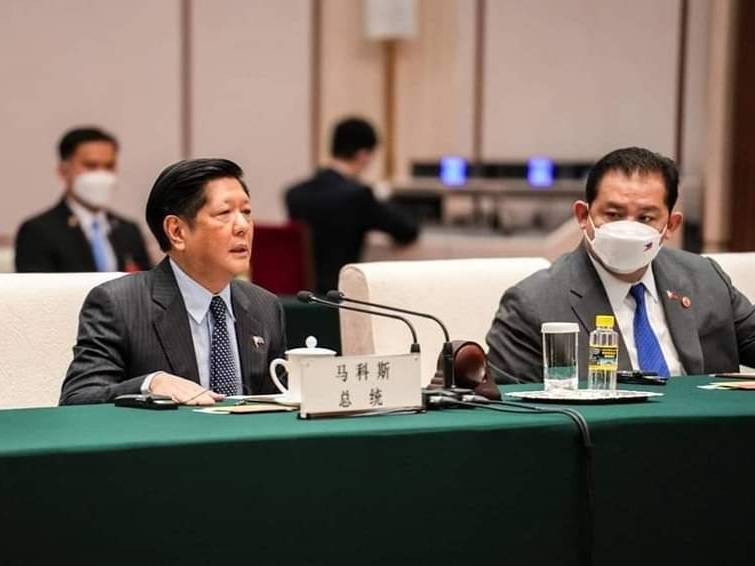President Ferdinand “Bongbong” Marcos Jr. is repaying the hospitality of Chinese President Xi Jing Ping by inviting him and First Lady Peng Liyuan to visit the country, Speaker Martin Romualdez said.
Marcos held a state visit to China last week, expressing his appreciation of the warm hospitality extended to him and his entourage.
The precedent-setting visit was a resounding success, according to Romualdez, who was with the President in the trip to Beijing.
The Speaker took note of the “chemistry” shared by the two heads of state.
“The state visit was highly successful because there were many engagements at different levels. For instance, we had our first meeting with the standing Chairman of the National People’s Congress (of China), who is my equivalent,” Romualdez said.
“Upon the instruction of our President, we shall engage our counterparts at the Parliament — at our Senate and Congress level,” he added.
Trade Secretary Alfredo Pascual, meanwhile, said the China trip yielded $7.32 billion in investment pledges from nickel processing, power batteries, electric vehicles, electronics manufacturing, and steel manufacturing businesses.
A roundtable discussion, which was graced by former President Gloria Macapagal Arroyo, Romualdez, Cabinet members and Chinese executives, tackled investments in the Philippines, particularly in strategic industries in the manufacturing sector.
The Philippines has been the supplier of 60 to 70 percent of China’s total imports of nickel ore and concentrates.
Chinese companies are also increasingly interested in the discussions on discouraging the export of unprocessed nickel ore.
Nickel set to boom
“The processing of nickel and manufacturing of batteries and e-vehicles are vital to the Philippines’ economic transformation. Both sectors can create a lasting impact on our country’s industrialization, economic development, clean energy future, and climate resilience,” according to Pascual.
Further, Pascual also boasted that the Philippines now has a healthy and competitive business environment that will enable strategic and sustainable manufacturing companies to thrive.
He underscored that the Philippines is a key player in the green metals sector, which are vital to the global transition to clean energy, saying that, “the Philippines has over nine million hectares of land with mineral potential, 92 percent of which have yet to be responsibly utilized,” he said.
He invited Chinese businessmen to look at mining since the Philippines has over 450 million metric tons of nickel reserves, as the country is home to nickel mines, nickel processing plants, and copper mines.
“And we are keen to have investments in value-adding mineral activities,” he stressed, noting that the metals industry is vital to the economy as it provides employment opportunities to a significant portion of the population, both directly and indirectly.
The government also expects to receive at least $1.5 billion in investments from the Chinese government to set up the country’s first liquid steel plant, the country’s envoy to China announced.
In a press briefing, Ambassador to China Jaime FlorCruz disclosed that during the state visit of President Marcos to China, he signed a bilateral agreement that is expected to revive the country’s steel industry through the proposed investment.
“If we look at the 14 agreements, we can see some solid projects on the table. One example is the agreement between Baowu and SteelAsia,” FlorCruz said.
The envoy said the Philippines is one of the few countries in Southeast Asia that does not have its own steel mill, which the government expects to generate as many as 3,000 jobs.
Promising agri gateway
Pascual also presented the Philippines as a promising gateway for agricultural and agribusiness products during the said meeting.
The roundtable discussion has also become an avenue to provide Chinese businessmen an overview of the Philippines’ Agribusiness Sector and facilitated the sharing of the country’s major interests in establishing cooperation with China and maximizing the potential of bilateral agricultural cooperation, especially in areas such as agricultural trade and agribusiness investments.
“As an agriculture-based manufacturing hub, the Philippines has a large domestic market of more than 110 million Filipinos. Our country’s rising middle-income class drives consumption.
In 2021, private consumption comprised over 70 percent of the GDP. We also have a large working-age population and a growing pool of skilled workforce,” he said.
The meeting covered trade, investments; and agricultural Inputs. The Philippine delegation pushed for an increase in the number of fresh produce with access to the Chinese market and confirmed that the market for durian fruit is now open to Philippine exporters and Chinese importers.
